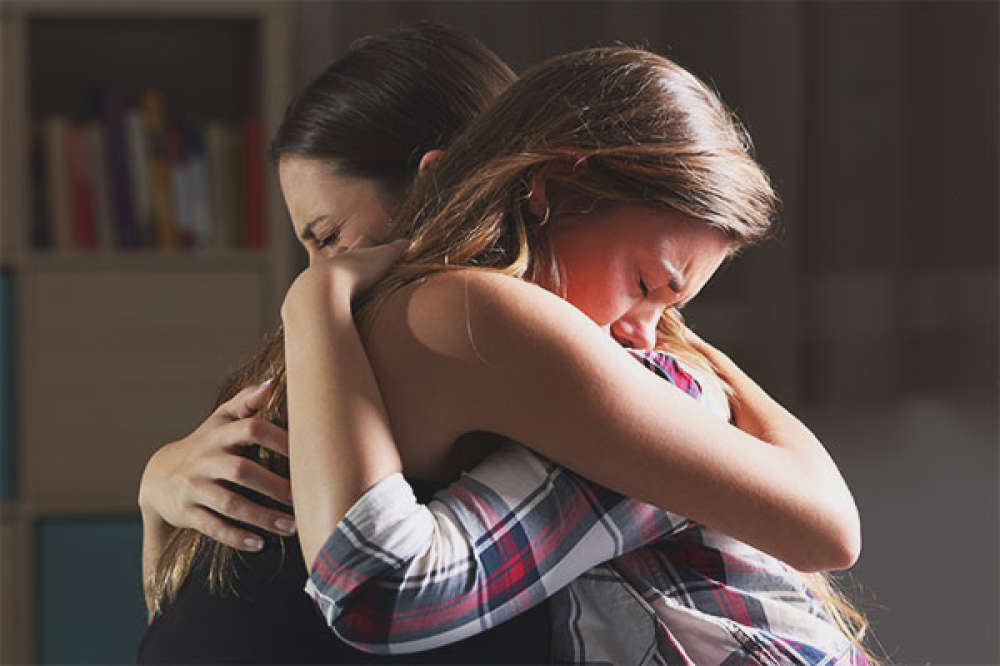Think back to a time when you were feeling stressed out, sad, distressed, or anxious. What did you do? Many of us turn to our loved ones for support. We may ask for a hug, a sympathetic ear, or some advice. After all, we humans are social creatures who usually find value in connecting with others in times of stress.1 In fact, studies indicate that providing and receiving social support (emotional and psychological assistance from others in our lives) is considered evolutionarily adaptive, because it allows us to create and foster relatively altruistic societies.2
Additionally, as studies indicate, in today’s society, social support is associated with decreased mortality,3 greater resilience to stress, lower levels of depression and anxiety, higher self-esteem, and an enhanced ability to cope with stressors such as bereavement, job loss, trauma, and illness.4 Social support from friends and loved ones has also been shown to buffer the effects of both anxiety and depression.5 In effect, the evidence suggests that social support is an important mechanism in boosting our overall mental health.
Emotion Regulation
Despite the evidence highlighting the importance of social support on mental health, particularly on emotion regulation and stress, most studies on this topic focus on intrapersonal emotion regulation, or the ways in which we choose and apply strategies to reduce distress for ourselves.
But many of us often turn to loved ones for advice on managing distressing situations. We utilize interpersonal emotion regulation, which is defined as the ways in which others choose a strategy to reduce distress for us.6
It’s Interpersonal
To examine interpersonal emotion regulation, researchers at Bar-Ilan University and the University of Haifa conducted a study on 47 couples in long-term relationships.7 One member of each couple was randomly assigned to view a series of emotionally distressing images. They had to rank their level of distress, and apply one of two emotion regulation strategies: distraction (drawing the attention away from the images) or reappraisal (reinterpreting the meaning of the images). They were also randomly assigned to apply either intrapersonal regulation (their own emotion regulation strategy ) or interpersonal regulation (the strategy chosen by their partner).
The results indicated that those who applied interpersonal regulation reduced their distress more effectively. Simply stated, this study showed that interpersonal emotion regulation was more effective than intrapersonal emotion regulation.
Social Support
The findings of the study make sense when considering the large body of literature on social support: that receiving emotional support and advice from others buffers the effects of stress and anxiety.4, 5 The findings are also consistent with studies indicating that having an outside perspective on an emotional situation can be helpful for emotion regulation.8
However, it’s important to note that the experiment was conducted on only romantic partners and on individuals who do not have clinically significant depression or anxiety. While turning to your romantic partner for advice may be helpful to cope with minor levels of distress, further research is needed to examine this in other relationships, as well as in relation to coping with distress related to anxiety and depressive disorders.
Sources
1. Walen, H. R., & Lachman, M. E. (2000). Social support and strain from partner, family, and friends: Costs and benefits for men and women in adulthood. Journal of Social and Personal Relationships, 17, 5-30.
2. Neuberg, S. L., Kenrick, D. T., Schaller, M., Fiske, S. T., Gilbert, D. T., Lindzey, G. (2010). Handbook of Social Psychology. New York, NY: Wiley & Sons.
3. Berkman, L. F., Glass, T., Brissette, I., Seeman, T. E. (2000). From social integration to health: Durkheim in the new millennium. Social Science and Medicine, 51, 843–857.
4. Southwick, S. M., Vythilingam, M., Charney, D. S. (2005). The psychobiology of depression and resilience to stress: Implications for prevention and treatment. Annu Rev Clin Psychol, 1, 255–91.
5. Cohen, S., & Wills, T. A. (1985). Stress, social support, and the buffering hypothesis. Psychological Bulletin, 98(2), 310-357.
6. Zaki, J. & Williams, W. C. (2013). Interpersonal emotion regulation. Emotion, 13(5), 803-810.
7. Levy-Gigi, E. & Shamay-Tsoory, S. G. (2017). Help me if you can: Evaluating the effectiveness of interpersonal compared to intrapersonal emotion regulation in reducing distress. Journal of Behavior Therapy and Experimental Psychiatry, 55, 33-40.
8. Lutz, J., Herwig, U., Opialla, S., Hittmeyer, A., Jancke, L., Rufer, M. et al. (2014). Mindfulness and emotion regulation- an fMRI study. Social Cognitive and Affective Neuroscience, 9(6),776-785.
Carol S. Lee is a clinical psychology doctoral student at University of Massachusetts Boston. She received her Bachelor of Arts in psychology from University of California San Diego in 2012 and her master’s in clinical psychology from UMass Boston in 2015. Carol works with Dr. Sarah A.
Hayes-Skelton to examine how and why therapeutic exposures and behavioral experiments in treatments for anxiety disorders work. In an effort to examine one piece of this, Carol’s current research draws from both social and clinical psychology to examine the process behind engaging in a behavior despite any fear or anxiety associated with that behavior. Carol and Dr. Hayes-Skelton collaborate to write articles for Anxiety.org.



